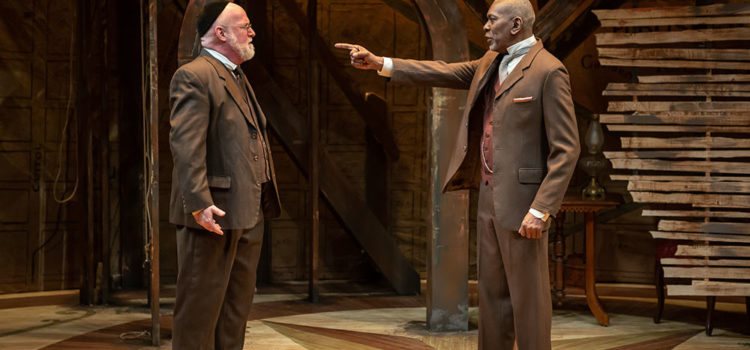By Lynn Venhaus
Managing Editor
“Nonsense and beauty have close connections,” Edward Morgan Forster once wrote.
Playwright Scott Sickles took that phrase as the title of his splendid play,
which the Repertory Theatre of St. Louis helped develop. And oh, what a
starting place it is.
“Nonsense and Beauty,” Sickles’ timeless tale of love and
forgiveness, is set in a very different era where same-sex relationships were mostly
hidden, and famous British author E. M. Forster is caught up in the nonsense
and beauty of a long affair with a man 23 years his junior – who will marry a
woman during this conflicted period.
Not your garden-variety real-life love story, as it
unfolds, we discover a believable love triangle with likable people – no
villains, wrapped in a very complicated forbidden relationship between two complex
men, while on the sidelines, there’s the unrequited love of a dear friend who desires
more. Additionally, there’s the unconditional love of a mother, although a prickly
and miserable woman.
In lesser hands, this would be a turgid soap opera with
starched collars. And while the poignant play unleashes an emotional
rollercoaster, it’s contained in an elegantly rendered production that is
exquisitely acted and sharply directed.
Staged crisply by Seth Gordon downstairs in the Studio Theatre, that intimate
space and the in-the-round format suits the play well. My fondness for the
characters grew with each scene, as their connections with each other were
conveyed so well.
Forster, known to his close friends as Morgan and gay, was
the celebrated novelist (“Howards End,” “A Room with a View,” “Where Angels
Fear to Tread,” “A Passage to India”), a prolific essayist and 16-time nominee
for the Nobel Prize for Literature.
Considered a humanist, the stuffy conventions of the
upper-class British society he lived and worked in were a source of material
for him, as he could not live life out loud in such a universal state of
repression. After all, homosexuality was illegal in the United Kingdom until
1967.
He was an intelligent man of impeccable manners, and
Jeffrey Hayenga excels as showing us his wordly refined side, but also his
yearnings and longing for a life he could only imagine. Hayenga’s absorbing
performance is tender and touching.
After he met London policeman Bob Buckingham, a jolly old
chap of no discernable stature, at the Cambridge-Oxford boat race in 1930, they
began a risky on-and-off relationship that would span 40 years.
TUESDAY, MARCH 5, 2019 – This is the Repertory Theatre of St. Louis’ production of “Nonsense and Beauty” as the Loretto-Hilton Center. ©Photo by Jerry Naunheim Jr.Their friendship was tested when Bob courted and married smart
and feisty May, a no-nonsense nurse who did not follow up any possible
suspicions about the men spending ‘alone’ time together. She stayed in the
dark, whether it was of her own choosing or she just didn’t go there in her
mind.
Forster was a major presence in their family’s lives.
Nobody meant to hurt each other, but oh, what aching and pain endured.
An engaging pair together, Robbie Simpson as Bob and Lori Vega as May displayed genuine sparks as their relationship grows into matrimony and parenthood. Nevertheless, how confusing for all — neither Bob nor Morgan could quit each other, so therefore, their friendship survived through the ups and downs of their lives.
TUESDAY, MARCH 5, 2019 – This is the Repertory Theatre of St. Louis’ production of “Nonsense and Beauty” as the Loretto-Hilton Center. ©Photo by Jerry Naunheim Jr.Another constant was longtime friend, the distinguished
writer J.R. Ackerley, wondrously portrayed by John Feltch. He brings more to
the urbane and glib character than tossing off bon mots and smirking about the
confines of society. He pined for more with Morgan, but that was not to be. He
befriends May, something neither expected, and his wit well-serves the
production.
Feltch, so good in “Vanya and Sonia and Masha and Spike” in
2015 (and St. Louis Theater Circle nominee), has a regal stature and is an
erudite sounding board throughout the show. In the movie, his character would
have been played by Clifton Webb or Vincent Price – or even James Mason.
As E.M. Forster’s battle-ax of a widowed mother, Lily, Donna
Weinsting astutely captures the grand dame’s controlling and cantankerous ways.
The entire ensemble is finely calibrated to show the fragility,
disappointment and deep love between the characters. The play’s bittersweet
nature is imparted in multiple ways.
Brian Sidney Bembridge’s minimal set, enhanced by his eloquent lighting design, allows smooth flow of the characters in conversation. Bembridge won the St. Louis Theater Circle Award for “The Royale.” Felia K. Davenport’s costumes defined the periods succinctly, and Rusty Wandall’s sound design provided nifty vintage touches. Leiber and Stoller’s “Is That All There Is?” was a wise choice to open and close the show.
Gordon, The Rep’s Associate Artistic Director, had nurtured
this project even before he further developed it as part of The Rep’s 2018
Ignite! Festival of New Plays, which he started after coming to the Rep. He
directed its first major public reading in 1996 at the Carnegie Mellon Showcase
of New Plays.
This is the sixth play from “Ignite!” to become a full-fledged
production, and this world premiere is a dandy – a lovingly crafted work of
substance, that means something, where the attention to detail is strong, and
the approach thoughtful.
The
Repertory Theatre of St. Louis presents “Nonsense and Beauty” March 8 – 24 in
the Emerson Studio Theatre, 130 Edgar Road. For tickets or more information,
visit www.repstl.org. Box Office phone is
314-968-4925.

Lynn (Zipfel) Venhaus has had a continuous byline in St. Louis metro region publications since 1978. She writes features and news for Belleville News-Democrat and contributes to St. Louis magazine and other publications.
She is a Rotten Tomatoes-approved film critic, currently reviews films for Webster-Kirkwood Times and KTRS Radio, covers entertainment for PopLifeSTL.com and co-hosts podcast PopLifeSTL.com…Presents.
She is a member of Critics Choice Association, where she serves on the women’s and marketing committees; Alliance of Women Film Journalists; and on the board of the St. Louis Film Critics Association. She is a founding and board member of the St. Louis Theater Circle.
She is retired from teaching journalism/media as an adjunct college instructor.


